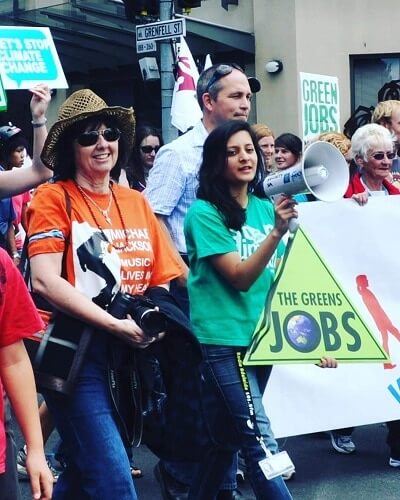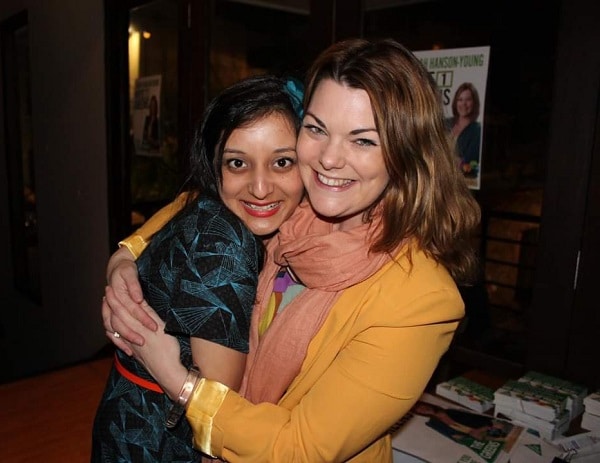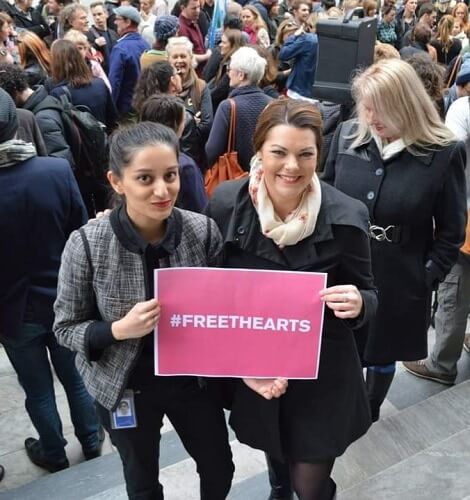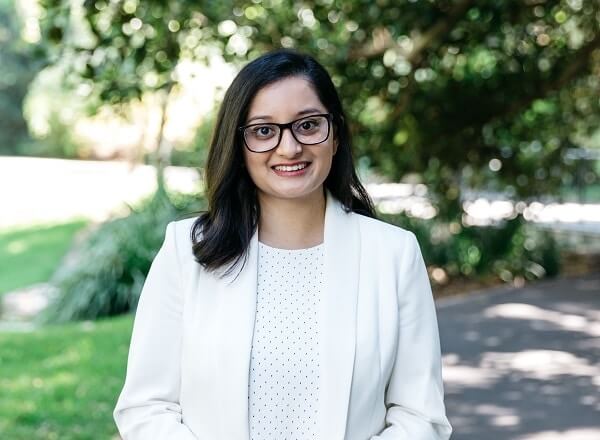You’ve been out and about campaigning now for the past 12 months. Tell us, what’s the mood like out there in the electorate?
Change is in the air. This election the Greens have knocked on more doors, called more people than ever before, and people aren’t happy with the status quo. The cost of living is going up, housing is increasingly insecure, wages are stagnating, healthcare is hard to access and people feel like they’re not being listened to. And of course, particularly after the floods, climate change is back at the front of our minds. People are seeing that the old ways of doing things aren’t working for them. I think a lot of people are finding their own values and hopes reflected in the platform being championed by the Greens, where their interests are put ahead of the big end of town.
What are the three main changes you wish to make if you are to be elected?
If elected to join Robert Simms and Tammy Franks Members of the Legislative Council in the State Parliament, the Greens would be in the balance of power within our own right for the first time. This means no matter who forms Government the Greens will push the next Government to invest in public housing, fix our broken health system, and tackle the climate crisis.
There have been startling revelations in the past year about the misogyny that is rampant in Parliament, and politics overall. Why would women want to be in politics?
It’s hard to look at our Parliaments right now and imagine them as somewhere we would want to be. Time and time again we’ve seen these institutions let down women. I think it’s fair to say that the collective anger of women runs deep right now, but I think it’s time for us to use that rage. The people who have oppressed and disempowered women over years won’t stop doing so on their own, so we need to collectively take the power back. Our Parliament should be representative of the community, and while women make up half of our population, they only make up 29% of the South Australian Parliament. In 2022, this is unacceptable.
There is much disillusionment also with politics and politicians in general. What needs to be done to change that public perception?
If we want politics to work for people and planet – not for private profit – we need to use every election as an opportunity to replace those in power who serve private interests. The Greens have been calling for a ban on political donations to political parties from fossil fuel industries and other corporations. Until we clean up politics and bring integrity to politics everyday people will struggle to make ends meet and the environment will continue to be destroyed. The Greens believe people need to be inspired for change and we need political leaders who will remind people that at the end of the day, the power is in their hands.
Why Greens?
I joined the Greens as an environmental studies student at the age of 17. I knew then that the Greens were the only party with a plan to tackle the climate crisis and that the Greens are a movement for people and the precious environment. The Greens party is formed on four pillars: ecological sustainability, participatory democracy, social justice and peace and non-violence. All of these values are well aligned with my own and I believe in the current times where there is war and violence and the environment is being destroyed, the Greens party’s vision and values are now more relevant than ever before.

Describe your journey in politics so far.
I never saw myself as a political candidate, despite working in the State Parliament for a significant period as an Adviser and being across more than twenty portfolio areas that ranged from industrial relations to animal welfare. I was across every state contentious issue and managed all parliamentary business. I have also had the absolute privilege of working for Senator Sarah Hanson-Young as a campaign staffer in 2013 to win back the Senate seat for the Greens.

If someone had said to me a decade ago that I’d be one of the lead candidates in this election, I wouldn’t have believed them. The Greens party have absolutely invested in me. I have had every opportunity to build my leadership skills and I have grown more and more confident in the way I seek to advocate for the community that I seek to represent.
I also learnt quite a lot from members of the United Nations Young Women’s chapter that I was a part of more than a decade ago now. I learnt about grassroots advocacy and the importance of campaigning on women’s rights.
What draws you to politics?
I have always believed that politics should serve the interests of everyday people and not big corporations. I feel an absolute need to be the change that I want to see in the world. South Australian Parliament ranks last of every other jurisdiction in the country on gender equality and this election is an opportunity to choose diversity over more divisive politics.
The obligation I feel to be the change I want to see outweighs the reticence I feel about being in the public sphere – if not me, now … then who, when?

Tell us a bit about your personal background.
I come from a Gujarati family. I was born in the city of Ahmedabad in the state of Gujarat. My dad worked as a Forest Officer in remote parts of Northwest India. My mum was an Environmental Scientist who worked for the National Pollution Control Board of India. I grew up surrounded by nature and with very strong values about protecting wildlife and precious ecosystems. I grew up knowing full well that we need to respect nature and all its wilderness. Sadly, growing up in India I saw much of the land that belonged to Indigenous people being sold off to developers who replaced much of the wilderness with hotels and resorts. What once was an incredibly diverse ecosystem full of biodiversity was turned into commercial hotels for profit.
Every time I think about this, I remember my drives with my dad through the valleys and seeing parts of the natural landscape being developed and placed under construction. I still remember how angry I felt as a child at this sight. I think for me this childhood memory is one that keeps me grounded to my roots and is a strong reminder of what I am fighting for.
I’ve lived in South Australia for over two decades now. I’ve worked with some of the most incredible activists and advocates for progressive reform. University for me was a stepping-stone into transitioning from a student to an environmental activist. I went on to join several environmental groups and began my journey into green politics.
A final word for the voters?
If there was ever a time for people to do what they can to bring progressive political leadership to help tackle the environmental crisis, it’s now. And we need everyone to be a part of political change in both small and big ways. This means being informed about what your local MP is doing for the environment and everyday people. It also means participating in democracy by being informed about what’s going on in the world around you and actively doing your bit to change the world for the better. We must remember that people in power only hold all the power by keeping you from knowing what everyday people are capable of, so let’s not let them win.
READ ALSO: Federal elections 2019: Wins and losses for Australia’s Indian community




